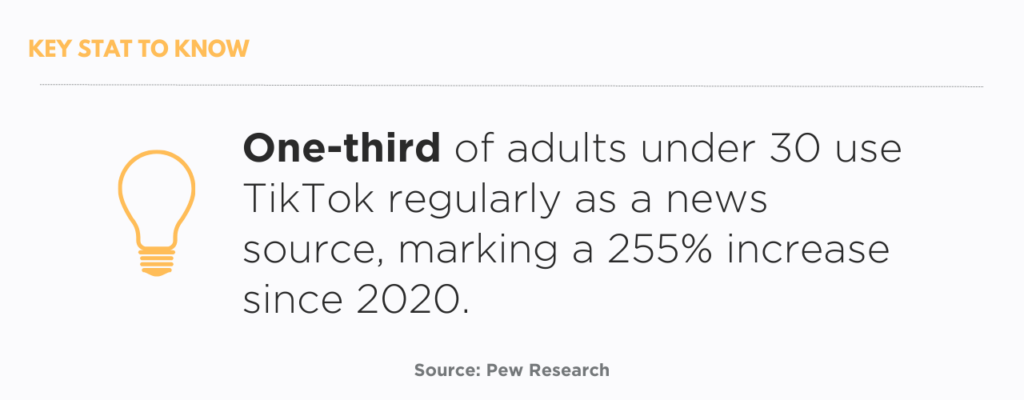
Below is a curated list of 2024 Gen Z trends, facts, stats, figures, and media consumption from GWI, Statista, eMarketer, Pew Research, and directly from social networks. It will be updated as new Gen Z insights and research are released. [Updated: Feb 21, 2024]
See the 2023 Gen Z data.
The New Age of Gen Z
A new report from GWI highlights Gen Z trends for 2024. Here’s a breakdown of actionable insights for marketers and brand communicators.
Mental Health is a Priority: Gen Z is the most likely generation to report having a mental health condition, with those in the U.S. being over three times more likely than the average to say so. They are also 12% less comfortable discussing mental health issues, underscoring the need for sensitivity in brand communications.
Diverse Content Consumption: While Gen Z’s rapid adoption of TikTok illustrates their preference for short-form video, their equal engagement with long-form content reveals that brands should employ a nuanced content strategy, focusing on both format and length.
AI Adoption Among Gen Z Workers: Gen Z shows a pronounced enthusiasm for AI, with many already incorporating it into their work routines. This demographic’s openness to AI suggests businesses should leverage AI technology to attract and retain this generation of workers.
Psychographics Over Demographics: Gen Z’s identity is influenced more by their interests, passions, and beliefs than by age, gender, or language. Brands should thus prioritize psychographic factors in their marketing strategies to effectively connect with this audience.
Innovative Information Seeking: Gen Z often bypasses traditional search engines in favor of image and voice searches and AI chatbots. This behavior indicates a shift in digital engagement strategies, with a 9% higher likelihood of using these alternative search methods than older generations.
Challenging Generational Stereotypes: The stereotype of Gen Z as avid gamers holds some truth, with a 9% higher likelihood of gaming outside China and India than the global average. However, their social and altruistic values vary significantly by region, suggesting a one-size-fits-all approach to this generation is ineffective.
Evolving Life Stages: As the oldest Gen Z members approach their mid-20s, their interactions with products and services around automotive, insurance, and finance are expanding. Despite this, Gen Z is 40% less likely to have high purchasing power, especially in markets like the Philippines, Indonesia, and Mexico, challenging the notion of their financial independence.
Social Gaming Behaviors: Gen Z’s gaming activities are highly social, with a notable preference for playing online with friends or strangers. This demographic’s social approach to gaming opens up opportunities for brands to engage through influencer partnerships, advertising, and in-game purchases, emphasizing the communal aspect of gaming among this generation.
Gen Z News Consumption
Gen Z consumes news through social media platforms, notably Instagram and TikTok, a trend that reflects the generation’s broader media consumption habits. Unlike Millennials, who seek out news directly from trusted sources, Gen Z is often exposed to news content incidentally while engaging with social media.
Key Points:
- TikTok has emerged as the primary news source for Gen Z, with its influence extending to a broader American audience. A Pew survey from 2023 highlighted that one-third of adults under 30 use TikTok regularly as a news source, marking a 255% increase since 2020.
- Social media serves as a discovery tool for Gen Z for entertainment, influencers, and news. Despite this, there’s an acknowledgment that this initial discovery often leads to further research or conversations about the news topics.
- TikTok is praised for offering diverse perspectives, including personal narratives, which Gen Z values highly. This preference for “primary sources” showcases a desire for authentic, firsthand accounts.
- The shift in news consumption habits has prompted media outlets to adapt their strategies, focusing on creating explainer videos for TikTok and text-based content for Instagram, aiming to engage Gen Z where they are most active.
- However, relying on platforms like TikTok for news also raises concerns about misinformation, mirroring issues previously seen with Facebook’s impact on news dissemination among older generations.
In essence, Gen Z’s approach to news consumption reflects their broader digital habits, emphasizing social media as a primary source of information. This trend challenges traditional media outlets to innovate in how they deliver news, balancing the need for engagement with the imperative to ensure information accuracy.
